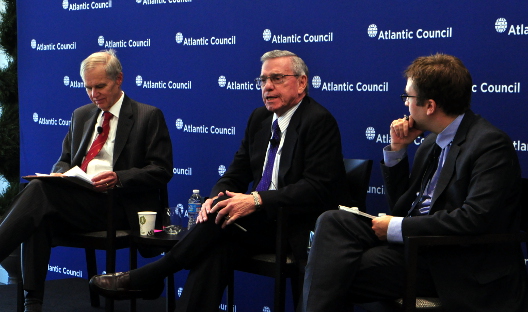 Power is shifting to Asia. The development of the Trans-Pacific Partnership (TPP), an ambitious trade agreement among twelve countries in the Asia-Pacific region, will play a major in that shift by aiding the economic and security integration in Asia with Western powers. On December 3, 2013, the Atlantic Council’s Brent Scowcroft Center on International Security held a panel discussion as part of its Cross-Straits Seminar Series on the Trans-Pacific Partnership and Asia.
Power is shifting to Asia. The development of the Trans-Pacific Partnership (TPP), an ambitious trade agreement among twelve countries in the Asia-Pacific region, will play a major in that shift by aiding the economic and security integration in Asia with Western powers. On December 3, 2013, the Atlantic Council’s Brent Scowcroft Center on International Security held a panel discussion as part of its Cross-Straits Seminar Series on the Trans-Pacific Partnership and Asia.
Additional Resources |
To discuss the TPP, and what it means for Asia and Taiwan, specifically, the Atlantic Council invited two prominent experts to hear their thoughts: Dr. Richard Bush, director of Center for East Asia Policy Studies at the Brookings Institution; and Mr. Clyde Prestowitz, president of the Economic Strategy Institute. The event was moderated by Mr. James Politi, US economics and trade correspondent of the Financial Times.
Issues discussed included other US trade agreements; why Asian countries want (or do not want) this agreement; the stumbling blocks for ratification in the US government; and whether the TPP is economically strategic for both the United States and Asia; or a politically motivated process. Further, the event focused on whether countries outside of the current negotiations, like Taiwan, might want to join and what joining the TPP would mean for them.
This event was part of the Brent Scowcroft Center on International Security’s Cross-Straits Seminar Series, which looks broadly at major security and economic issues impacting the strategic landscape in the Asia Pacific and how they will affect the US-China-Taiwan trilateral relationship. Past topics of discussion include growing Asian defense spending, the challenge of Chinese cyber attacks and espionage, and the impact of nationalism on security in East Asia.
